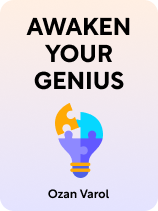

This article is an excerpt from the Shortform book guide to "Awaken Your Genius" by Ozan Varol. Shortform has the world's best summaries and analyses of books you should be reading.
Like this article? Sign up for a free trial here.
What makes you special? How can you uncover your unique talents and abilities?
Discovering your true self and what sets you apart is a journey of self-reflection and exploration. In Awaken Your Genius, Ozan Varol offers insights on how to tap into your distinctive qualities, drawing from both your childhood experiences and your current circumstances.
Keep reading to discover Varol’s tips for uncovering what makes you special and how to apply it to your life today.
What Makes You Special?
Varol writes that your true self is special. Once you’ve developed greater self-awareness and new skills such as open-mindedness and independent thinking, you’re ready to figure out what makes you special. Varol shares two tips for accomplishing this.
Remember your child self. Think deeply about any strange qualities you exhibited as a child (or any childlike qualities you exhibit now). What do these qualities suggest about your unique skills or talents? For example, maybe you had (or still have) an inexplicable fascination with ancient Egypt or a talent for building intricate LEGO structures. These qualities could suggest that you have a natural inclination toward history or an aptitude for design and engineering. You can use this knowledge as a basis for exploration and discover how else you can apply your special skills.
(Shortform note: The activities you engaged in as a kid helped shape your adult brain through a process called neuroplasticity, which is why remembering your child self can help explain what’s special about you—there’s often a direct link between your early interests and your current skills and talents. Through neuroplasticity, the brain’s structure adapts in response to experience. When you repeatedly focused on an interest as a kid, you strengthened neural pathways (connections between brain cells) related to the interest. For example, constructing LEGO models may have enhanced your spatial reasoning skills, or learning about ancient Egypt could have helped you learn to empathize. These connections remain strong over time if you keep reinforcing them.)
Understand what’s special about you now. It’s tempting to replicate ideas and strategies that made you special in the past, but your current commitments and activities should reflect what makes you special now. Instead of repeating the past, Varol recommends that you reflect on your previous experiences, identify what worked for you then, and adapt those strategies to suit your current situation.
For example, maybe your childhood interest in ancient Egypt has morphed into a passion for writing historical fiction. It wouldn’t make sense to become an Egyptologist, even if that’s what you wanted as a kid, because you’ve changed too much over the years. But you can draw on your knowledge of ancient Egypt to infuse your historical fiction with authenticity and depth, creating narratives that uniquely reflect your current interests and perspectives.
(Shortform note: To understand what’s special about you now, first recognize that your circumstances are constantly evolving. As Darren Hardy discusses in The Compound Effect, three factors influence all of your choices—your own mental input, the influences of people around you, and the environment you inhabit. These elements are dynamic and subject to change over time. For example, your mindset may evolve as you gain new insights and experiences, the people influencing you may change, and your cultural or societal environment may shift. Adapting (rather than replicating) strategies you’ve used before allows you to remain responsive to these changes and ensures that your actions align with your current situation.)
Exercise
- What qualities, interests, or habits do you have today that you’d consider special? For example, maybe you spend a lot of time researching ancient civilizations.
- How could you use the traits that make you special to build a more fulfilling life? For example, if you have a special aptitude for learning languages, maybe you’d find a career in translation rewarding.

———End of Preview———
Like what you just read? Read the rest of the world's best book summary and analysis of Ozan Varol's "Awaken Your Genius" at Shortform.
Here's what you'll find in our full Awaken Your Genius summary:
- The reasons why you’ve abandoned your true self so far in life
- A former rocket scientist’s tips for embodying your true self
- How to achieve creative fulfillment and personal growth






